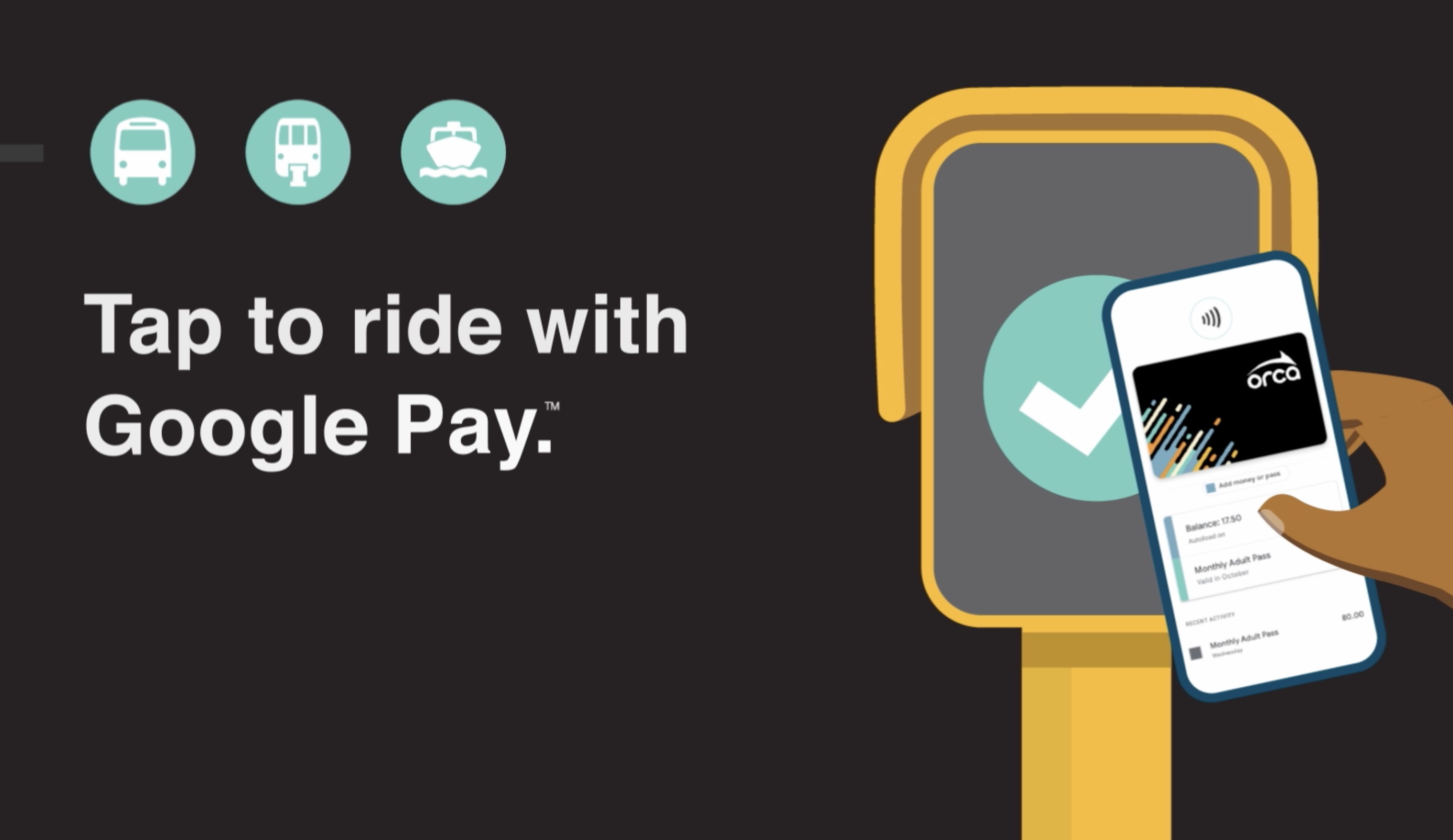The Puget Sound’s regional transit card payment system, ORCA, has launched its first mobile payments feature. Riders with Android devices can now use the Google Wallet app (powered by Google Pay) to pay for trips with a digital pass. This comes about eight months since Google announced the planned feature for transit agencies across the globe. The app function also works with Wear OS devices.
To use the new payment option, Android users will need to download and install the Google Wallet app to a device equipped with near-field communication (NFC) capabilities and then go through the process to add ORCA on the app as a pass. The steps are relatively simple:
- Open Google Wallet;
- Select the “Add to Wallet” option;
- Select the “Transit Pass” option;
- Search for and select “ORCA”; and
- Create a mobile ORCA card.
Users creating an ORCA mobile card will have the option to add money, add a pass, or transfer a physical card to their digital ORCA card.
Transferring a physical card to Google Wallet is free of charge and will pull in any existing ORCA e-purse funds and passes. This is available to all existing adult, youth, senior, disabled, and ORCA LIFT cards, except for certain employer- and organization-based cards which require the respective sponsor to opt into allowing digitization.
Users will need to move through several steps, including entering the respective card number and three-digit security code, and a special e-mailed verification code if the physical card was registered with myORCA. By transferring a physical card to a digital one, a user will be issued a brand new card number and the existing physical card will be deactivated from the ORCA system, rendering it inoperative.
The other option to create a new digital card without transferring a physical one will incur a $3.00 charge — same as buying a physical ORCA card — and have no impact on existing physical cards that a user may have.
Users adding e-purse money or a new pass to ORCA will need to add a preferred credit or debit card payment method. The minimum e-purse funds that can be added to ORCA is $5.00, but users otherwise have flexibility to load any amount or set up daily or monthly passes, such as a Regional PugetPass and agency-specific pass (e.g., King County Metro, Pierce Transit, and Washington State Ferries).
Once an ORCA card is created in the digital environment, it is mostly locked into the Google Wallet system and associated with the Google Wallet account it’s created in. Users can opt to move back to a physical ORCA card, but this will require coordinating with ORCA’s customer service unit, getting an entirely new physical ORCA card issued, and paying a $3.00 charge.
With ORCA loaded as a pass on Google Wallet, users will simply need to wake their mobile device and tap it at an ORCA card reader to pay for their trips.
Riders using Google Wallet, however, should be aware that a single ORCA pass is still only good for one rider, not multiple, and that they should keep their mobile device properly charged during the period of travel since proof of payment may be required. Additionally, riders with special types of ORCA passes, like RRFP and the U-PASS, should keep them on hand for other uses if they transfer the ORCA functionality to the digital environment.
Other digital payment options, like Apple Pay and an integration planned for Sound Transit’s forthcoming Sound RideGuide app, remain unavailable for now. When that might change is unclear with ORCA officials only saying, “We are committed to bringing the convenience of mobile payments to all our customers, but we have nothing else to share at this time.”
Another rider-requested feature, using NFC-equipped credit and debit cards directly at ORCA card readers, also has no defined timeline for implementation.
Stephen is a professional urban planner in Puget Sound with a passion for sustainable, livable, and diverse cities. He is especially interested in how policies, regulations, and programs can promote positive outcomes for communities. With stints in great cities like Bellingham and Cork, Stephen currently lives in Seattle. He primarily covers land use and transportation issues and has been with The Urbanist since 2014.


